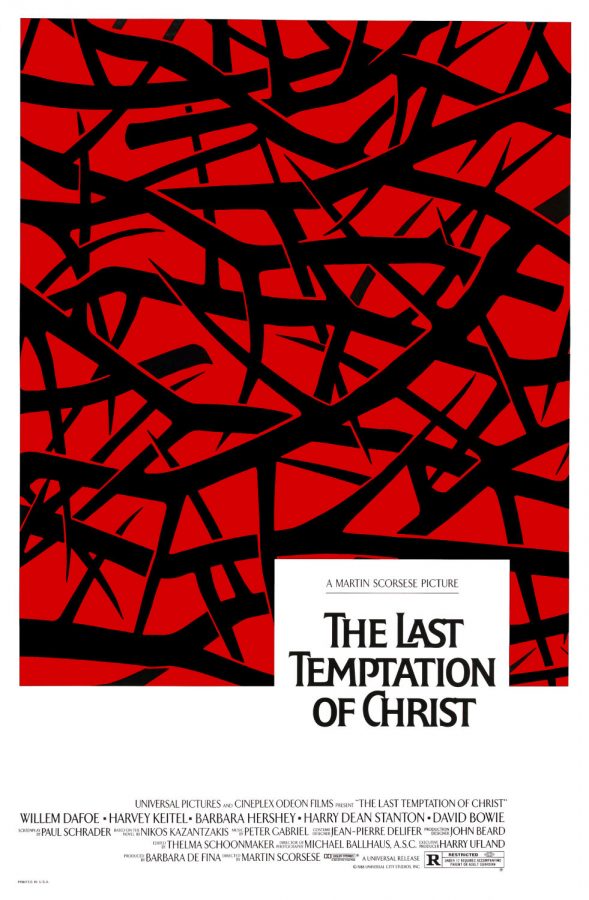Classics Review: “The Last Temptation of Christ” is a fascinating take on the Son of God
April 11, 2020
Martin Scorsese’s 1988 religious drama “The Last Temptation of Christ” is a powerful and deeply moving exploration of spiritual existentialism, and is therefore more than what its controversial reputation warrants it to be.
The film features Jesus of Nazareth, superbly played by Willem Dafoe, not as a godlike creature but as a human being with doubts, fears and flaws. He constantly struggles with what his place on Earth should be. Should he act as the son of God, bringing greatness and freedom to the Jews? Or should he live as a man among mankind, settling down to start a family with Mary Magdalene, played by Barbara Hershey? Additionally, he rebukes his parents Mary and Joseph in favor of his fate as the son of God, and mostly confides in Judas Iscariot, played by curly-haired Harvey Keitel, over his other disciples.
It is no surprise that the film attracted considerable controversy when it was first released in August 1988. Adapted by Paul Schrader from Greek writer Nikos Kazantzakis’s equally controversial 1955 novel of the same name (which is one of several novels banned by the church), the Christian right condemned the film for its blatantly sacrilegious depiction of Christ as a fallible being, down to him making onscreen love to his wife Mary Magdalene. Riots occurred that disrupted its showings in Europe, as Blockbuster later refused to stock VHS copies of the film and even Scorsese himself had to hire bodyguards for the time being. The outrage was universal, so much so that the film is still banned in several countries as of today.
Most contemporary religious films employ the Manichean outlook on the clear line between good and evil, or in this case between God and Satan. In the process, they avoid offending anyone religious, except cinephiles who might be sick of overly optimistic fare and expect some deeply realistic explorations of the human condition instead. It is also worth noting that movies such as the “God’s Not Dead” series and 2017’s “The Case for Christ” achieve box office superiority, while films that do try to subvert the conventions of the religious film subgenre, like Scorsese’s 2016 religious film “Silence” and Schrader’s “First Reformed” from 2017, languish in near obscurity.
“The Last Temptation of Christ” diverts from the reassuring absolutes of organized religion, leaving room for nagging doubt. Its characters challenge their faith several times rather than blindly proclaiming it. Even as Jesus performs miracles in the second half of the film, he regards them with detached interest. In one particular miracle where he raises Lazarus from the dead, the camera cranes past Jesus’s shoulder into the darkness of the tomb, signifying that he is entering the dangerous, unknown void with what he is about to do. Scorsese’s iteration of the Son of God asserts that no one, not even Him, ever really knows how God works; hence the oft-repeated mantra that He works in mysterious ways.
Schrader himself has acknowledged years later that “The Last Temptation of Christ” is indeed blasphemous. However, it’s not necessarily blasphemous in the supposed context that it gives Jesus a bad name. Instead, it is blasphemous in the way that Jesus was creating God; in Kazantzakis’s words, “It is not God who creates us, but it is we through our striving who create Him.” This complex, anti-Cartesian outlook on God therefore subverts Jesus’s story into one that constantly wills Him into existence to give credence to His supposed love and wisdom for mankind.
The film can also be interpreted as Scorsese framing Jesus after his own persona, mirroring his own religious struggle. The filmmaker has always been attracted to the idea of a spiritually conflicted being in his crime dramas, down to characters such as J.R. in 1967’s “Who’s That Knocking at My Door” and Charlie in 1973’s “Mean Streets” (both coincidentally played by Keitel, no less). It’s no coincidence that Scorsese has chosen to boldly reinterpret Christ as a fallible being parallel to the countless self-contradictory characters that populate his films. He treats the world of Catholicism as a philosophical maze rather than a straight path to salvation, which makes the overall film as fascinating as ever.
What makes “The Last Temptation of Christ” stand out from other similar films is that it is not afraid to go through the Biblical story of Jesus, and then pull off a tricky tale of existentialism as a result. Alas, many religious folks may not see it that way, and will keep on harping on how the film is a disgrace for years to come. The film’s conclusion infers that by embracing the fact that there can be truly no absolutes in life, it is therefore imperative to embrace the unknown if anyone can ever be enlightened. By way of blinding white light and the heavenly sound of the bells, Scorsese’s epic religious tale earns its place as one of the most thought provoking religious films of all time.
Click here to find “The Last Temptation of Christ” on Showtime.










Robert Charles • Jan 26, 2021 at 11:55 pm
Thanks for a great post. Browse this list of interesting articles and essays on topics like health, happiness, productivity and more.